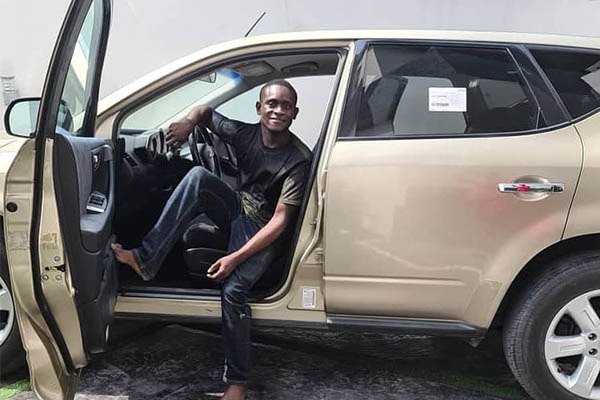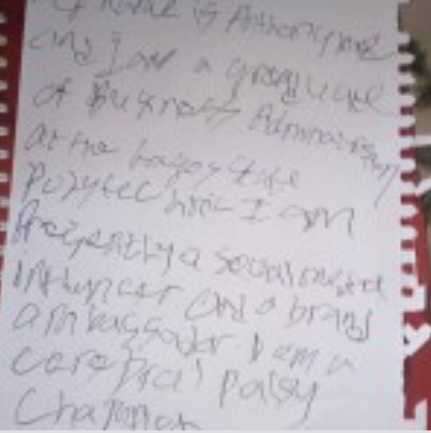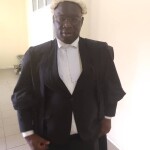He survived a regional exam body's exclusionary policies by his own wits. He then took things personally—again, not the way you expect.
By Olusegun Elijah
At the community primary school he started from in Surulere, kids called him Dejo, and friends, idiot. He answers to the one friends call him.
And it makes him tic.
Tony Kupe guffaws again, and yaps on about his friends, what people expected his life would be, and what they got. His jaw bones skew each time he starts, the upper and the lower molars grinding. The effort demands lots of calorie burning, which makes him quake in the seat he perches on— a splash of wine twinkling in the dusk that floats about in the two-bedroom flat.
“I grew up like an abnormal child. I crawled on my belly for two years,” he says. He engages his phone now. His fingers hammer down the keypad with pointy whorls that can crush the nib of a BIC pen if he's writing. But he's only tweeting his celebrity clients’ promotions to his over 5,000 followers.
“Mummy, come and talk.” He hardly mentions his father’s place in his growing up.
He can hear his mother step out of her kitchen now. Clangs of pots and spoons on the floor swell, hit the wall, and bounce back out into the parlor. The parlor walls, too, in gold complexion, fails to brighten the space Kupe and his mum deck out with three singles huddled close to a window. But the bare floor’s sheen, and the October mid-morning grey light streaming in from a window manage a dull glow. They just moved in to the apartment weeks after the youth ENDSARS rebellion simmered at its epicenter 26 km away.
“Ask her about me growing up.”
Memories of those years rush back—when she’d hoist Kupe up with amala sticks, and poured agbo down his young throat. “He stand up on his feet for the first time, and speak Yoruba on a Sunday one gospel singer minister in our church,” she says.
She waited years for his legs to get strong enough—to just prop him up—and then enrolled him in a regular school. She would back him there in the morning, and loaded the six-year-old bag of large, stiff bones on that same back at closing.
‘Thank God for ori and Tomtom,” Kupe says. His mouth gathers some whitish stuff at the corners. It spins up and down, like thread, as he spurts out words, croaks, whimpers, and laughs, some delayed, others interspersed, all narrating how his mum used Shea butter to massage his arthritic joints from his upper body down. The mentholated sweet dammed back the rivulets of drool flowing out of his mouth. Over two decades older now, he halts and spins on the legs when he walks, quivers when he talks, and yarns gummy fibres at the corners of his mouth.
He rubs his palms, jerks, laughs, and vibrates like he did the first time at their former hut. It’s a BQ tucked somewhere on a Methodist Church premises at Jibowu. Kupe granted the first interview for the story there. He just stepped out of a Nisan Murano SUV which wore a two-day coat of dust that matted its newish glamour. In the morning sun that rose to just a little caressing temperature, Kupe, in his round-neck T-shirt, emitted a tang of salt mixed with his own smell. He cut quite a figure with the dampness that muted his shirt’s grey-blue a hue or two.
He squared his broad shoulders now. “Ah! Who know Kupe for Lagos?” He sang it a decibel higher than his pitch, and quavered, either from muscle twitching or the jollity of his question. His eyes, sawdust-brown, held and devoured his guest during the bone-crusher of a high-five that followed. And he blinked last. “I’m sorry I’m just coming in.”
He jangled a bunch of keys erratically in his G-clamp grip, and spun ahead in a circular gait. The meeting moved to the one-room-and-parlour block that faced the church fence.
Inside, a 40-watt bulb lit the parlor furnished with two wooden chairs opposite each other. A visitor on the first could sneak a peep past the drab curtain, and do a double-take on the bedroom: not enough leg room to swing a cat. On the parlor entrance wall, in Kupe’s line of sight from where he sat, a cable ran from the side of the door post, entered a battered junction box housing a tangle of naked copper wire tips, all in the middle reaches of the wall, for anybody to grab. The crib loomed much like the new place. But not because Kupe is Idiot.

With more stiffness in his neck, more clenching in his knuckles, and more guttural laughs, he makes light of the chumminess that got him the tag. Mum listens on.
“Idiot…that’s what they call me.” He bursts into another energetic laugh in a snapshot that tones down the texture of his dark face. The contemplation dwells on his third name now.
A teenager who faced down exclusion in education, gamed a regional examination body, and came out a graduate and liberator of his kind, at 27—that teenager deserves a name.
His mum says she couldn’t have asked for anything better. “It’s not his fault.”
Her son’s schoolmates and her neighbours didn’t take that from her. They mocked Kupe until he got to JSS at the Community Secondary School, Surulere. “Some called me Iya Dejo,” she says. The wickedest of the mockers were Sunday and his father, next-door neighbours way back. They bullied him, snatched his toys. “Sunday beat him a day to the New Year in 2003. My son cannot stand up for a week. He didn’t offend him.”
But five years of being laughed at didn’t affect his performance in class, especially in math and other numerate subjects. Dejo became a hotshot in his school.
“The school vice principal announced on a particular day on the assembly that anyone that mocked and called me Dejo would be expelled,” he says.
The Discrimination against PWDs Act had not yet gelled out then. That delay was the second strike against him. The first, mum narrates, came at birth. All she could do then was never enough to change how her son turned out. But the VP exerted her weight to control how her school reacted to Kupe. A relief of sorts. The boy then mixed freely, and buddied up with many in the school, including Sewan and Mosunmola. He whoops whenever he talks about the two ladies. He even bagged a girl—Gloria who held his heartstrings till 2019. He joined four clubs, and participated actively. His academic club finished their math syllabus midterm.
A teacher later advised Kupe’s mum to buy her son a typewriter. Because the school might not always allow the boy to have somebody sitting beside him to write whatever Kupe dictated during exams. The VP cut him all that slack.
That N3,500-typewriter helped a lot in his JSS 3 exam in 2007, which he massacred. Kupe later improved his typing skills by snagging the Lagos government computer training opportunity. He even went to Ikeja to learn more computer programmes. His dream of becoming an engineer vaulted higher at the SS level. His circle of friends also widened.
“We had our own clique,” he says. Kehinde Ojo, his seat partner he paid to help him write from primary school to secondary school, confirms Kupe is truly Idiot—and reveals he knows him backwards. “There’s no question he can’t ask anybody,” Kehinde, now a musician, says.
Kupe enjoys daring, alone or with his crowd. “We’d go to tutorial centres, parties, stadium, everywhere. Anything. Ah! Me!” He tries to remember the number of bicycles he and his friends rode to death after they started cycling in 2000. “From Surulere to the island.” He also courted many celebrities, including those cocooned on the island—like comedians Ayo Makun (AY), who introduced him to Ali Baba, Funke Akindele, and a tribe of other zanies.
Even in his Methodist Church, Kupe became the parish star. He sang. He recited Bible passages, topped Sunday school, and won Bible quiz competitions.
“I was shortlisted one year as a pilgrim to Jerusalem, but some people went behind to say I ‘no’ well,” he says, laughing and vibrating. “It was Revd. Richard that exposed them, and insisted my name remain there. And I went.” He was in SS 1 then. He came back, and joined the youth group of his church. “They called me Minus 1.” He says he learnt from that experience what matters in religion. “James 1:27!” He might have got that epiphany from the snazzy congregation he now belongs.
Kupe knew what it felt living a charmed life on easy street. He patted himself on the back for going that far, having demolished the JSS 3 exam in particular. He registered for his first WAEC three years after, with hubris. And he found favor again. The SS principal sent a letter, with Kupe’s medical record attached, to inform the exam council Head of National Office Uyi Uwadiae the candidate used the typewriter. Kupe hoped the council would see beyond his jerky fingers, and consider his intact brain. He expected the letter would return positive.
The night she fell into labour on Feb 14, 1991, Kupe’s mum had expectation, too. Not for a wunderkind, though. She felt just like any expectant mum for the last of her three children about to arrive. Her husband rushed her to Mercy Maternity at Ajegunle. After her water broke, the baby came out—the way it chose.
The exam council’s response to the principal’s request did come out eventually.
Damn!
But Kupe believed he still got everything covered. WAEC could go to blazes. He bristled with so much confidence he spared time to coach some of his classmates in their academic club.
His friends believed it was a walk over for him, having witnessed what they considered his brilliance. Mosunmola usually dissolved in tears watching Kupe dismantle algebra and calculus in class. “Academically, he’s good,” the fashion designer says. Kehinde also confirms Idiot never failed or repeated a class.
So Kupe assured himself he should swing this, too.

The air in the exam hall heaved with suspense that May. Kupe entered with confidence, spinning and twitching. A credit pass in every paper became the least he gunned for. But no one would take down his answers for him here. "No unauthorized material in here," the invigilators always announced. No typewriter for him to bang out his essays the way he did in JSS 3 exam. His hands jerked with the pen in the grip of a sweaty palm while he scribbled down the essays, stressing every nerve of his brain. Kupe wiggled like a fish doped out of its element throughout the exam.
“My friends I helped passed well,” he says. His voice grows husky, a modulated pitch he uses to narrate some past that still hurts, and he can’t understand why. He flunked every paper he sat for. Except Yoruba.
WAEC, NECO, JAMB, and other exam councils have no provision for most PWDs writing those board exams. Blind candidates have problem passing because there are no braille question papers. The system has no concern for amputees, either, except those who sit for the exams with their prostheses. Even after the 2018 Discrimination Act, many of the exam boards (WAEC provides braille now) have not been jolted to review their exclusionary policies on candidate with disabilities. Those candidates don’t enroll as such for most of the exams. Over 1,700 registered for WAEC last year. Among them were candidates like Kupe used to be.
Nigeria records 700,000 CP children over the last six years. University of Lagos Medical School Professor Abiodun Lesi puts it at three million . Their condition, experts say, presents varying degree of disabilities. Kupe’s hand jerks in bursts. His brain may know the correct letter of the script, and gives the command; his fingers then over respond, requiring exertion—to control. The scribbles he scratches out during this battle of nerves could be irritating. They don’t look like what delight WAEC script markers: copper-plate types. From well-coordinated digits.
Kupe had lost that neural control following his mother’s final swoosh at the Ajegunle maternity labour room.
The patter of his tiny leg sticking out of the birth canal continued till the following day. He hanged in there. His mum pined away in birth pang.
“At about 8 am, the hospital give us ambulance and send us to Island Maternity Hospital. The boy was already tired,” she says. “The doctor there pushed the baby’s leg back inside, gave me drip that made labour more hard, and warn the nurses not to do anything if labour hold me again.” She knew baby Kupe wasn’t enjoying all this drama, and felt it when it kicked out again—both legs out now. The nurses took charge, and rammed the flailing shanks back inside.
By the time the doctor delivered her of the baby, things had gone far.
“My baby look like rag,” she says. No cry. She learnt it already defecated inside her. “They put him on oxygen, and later in glass for one month. No cry throughout.”
The doctor assured them all would be well. He then recommended an injection. “We bought it for N80,” the mum says. He gave the baby. “That injection affect Kupe’s mouth, and make all his joints stiff.”
After WAEC policies ruined his first attempt at the exam, Kupe pulled himself up by his bootstraps. WAEC never changed its policy. Nor did it devise a telepathic method of marking the scripts of candidates able in their heads but disabled in their digits. He despised the regional exam council for that. Kupe also seemed already pissed off with the kind of Christianity he grew up to know: seeking miracles. That he can walk at all in his life, he says, is enough miracle. So his morale boost might have come from his faith in himself, and Sewan’s encouragement, which had been firing him on since JSS 3. Far back then, Kupe’s penned-up bitterness boiled over, against the system he believed expected brilliance from cursives and plates. He wanted to cop out of JSS, and sign on for auto mechanics apprenticeship. But Sewan gave him reason—his smart brain—not to quit.
As though the trust in his brain alone were enough to crush WAEC, Kupe headed into the 2011 November/December exams at A.A. Midas in Lagos, all plucked up. He paid N1,500 for each of the seven subjects he sat for. His contractor ghosted him once. Kupe had to write agric. science himself. The script markers would beat out their brains to make sense of the essay in only one paper, he thought. He was sure he got other subjects in the bag this time. Lightning wouldn’t strike a place twice.
The result came out.
Kupe had to bring his battered ego up again later.
“I was introduced to a criminal who specialized in helping people like me write WAEC in Ibadan,” he says of another attempt, after the last one in which WAEC withheld all his subjects. He forked out N70,000 for the new arrangement. But the criminal cut out during the exam. Someone who couldn’t even spell English words very well stood in, and wrote while the client dictated. Kupe later paid the knucklehead N10,000, and trudged back to Lagos a turkey.
During his losing streaks, Kupe. at a point, hit rock bottom. And he decided to quit like a man. His friend checked their results, and they passed. They told him. He too went to check online, saw, and refused to believe. The reality of his misfortune with WAEC weighed heavily on his thought.
“I notice he change, and keep to himself,” Kupe’s mum says. A report from Calabar about a frustrated WAEC candidate that knocked down a mouthful of Sniper lingered in the news then. She couldn’t just take her mind off Kupe in their BQ apartment. And whenever the wish possessed him, Kupe riveted his gaze on the broken junction box on the wall. “Go and grip it,” he recalls telling himself. Whether he had the ball to do himself in at that point could be a big question. But his mama refused to take a flyer on it. She stepped into the parlor with him each time he sat by himself. She shadowed him for all the three months he says the suicidal feeling lasted.
Mum and son later agreed to give WAEC another stab in 2013. Kupe vowed to do his damnedest here. An altar or choir boy in his predicament would scruple a little to follow through with the new plan. But Kupe hardened his mind. He sloughed off his JP toga, and got his fingers grimy. “My religion now is love,” he says. “And I want to balance the equation between children with disabilities and those with no disabilities.”
He worked out an arrangement with the centre where he registered. The scheme would transcend the first contract, and morphed into a bigger partnership—and a crusade he’d champion. He forged it into a statement of rights—the rights of bright candidates with handwriting disabilities—candidates whose dreams WAEC cares nothing about—to help themselves pass the exam.
The council wields the 2004 Exam Malpractices Act to scare off exam cheats. Sections 1, 3, and 10 empowered WAEC to arrest Kupe and his collaborators, and fling them in jail for three years—if they carried out their intention, and got caught. A showdown was evidently in the offing.
WAEC has crippled millions of toughs and serial failures among its candidates in its 68 years. It could easily make Kupe part of the stats, the least being a loser marking time at Ikoyi prison.
But Kupe made his plan, cut and dried.
He’d sit in on each session of the paper he enrolled for. Somebody would float up to his desk each time, and spirit away his answer script. Kupe would just sit pat—until submission time. He wouldn’t write a dot.
He actually stopped writing from hereon, and finally, to prove anything in life again.

Handwriting sample
That particular WAEC result and all it brought put his remaining confidence on steroids. He first bumped into OAP Yor at a birthday party. “I told him I wanted to work with him,” he says. Kupe attended another event in Abuja, wobbled his way up to the world’s richest black Aliko Dangote, and introduced himself. Kupe also launched his Kupe Foundation, and sealed an on-going deal with an NGO linked to billionaire Femi Otedola’s family. He says he even gatecrashed (online) into an SME funding programme a year before, and pitched his idea (event management) as a business admin graduate. He impressed the judges, who clubbed together, and gave him N1 million--for daring.
After their first meet-up, Yor showed Kupe to others in his circle. On Yor’s invitation, he ported from his old-time religion to that of the star-spangled House on The Rock. “Pastor Paul Adefarasin gave me my first iPad,” he says. He also met in that church the late gospel singer Sammy Okposo who sponsored his four year-programme at LASPOTECH—after AY paid the first school fee in 2013. He says the church picked up most of the tabs.
Kupe remembered his demon after matriculation, and felt it grip him again. Some rules don’t change. And he just learnt his school has a stricter exam policy. So he met the director of the programme he identifies as Oyede.
When WAEC’s registrar trashed Kupe’s principal’s letter three years before, the problem was different. At the tertiary level now, Kupe could use his typewriter and computer to write assignments and projects which normally form parts of grade points. Some of his exams could even come as multiple-choice. But he knew he still had to write—in longhand. “And external lecturers mark exam scripts at LASPOTECH,” he says
After screening him, Oyede decided.
He demanded Kupe attend class, and participate as much as he could during lectures. He also ordered only course lecturers should mark Kupe’s scripts. The director granted him all the concessions, and left the final approval for the rector.
Kupe did more than participate. He rocked the campus community, proved himself in class even with his hieroglyphics-like handwriting. He scored as high as 89 in math at ND 1, and even called for his cost accounting script to be re-marked because he initially scored 39.
ER sought to verify Kupe's statements of ND and HND diplomas dated 2018. The school’s public relations office won’t confirm even his matric numbers.

Kupe’s mum remembered Sunday and his father on Kupe’s graduation day. “The week he graduated was when AY also gave him that car,” she says. “Those calling me ‘Iya Dejo’ now call me ‘Mummy Kupe’.”
She received the father and son when they came to congratulate her and Kupe.
The broader culture that also believes he’s an invalid because of his handwriting wouldn’t believe Kupe could own a car, let alone have the brain to drive it.
“It took me three days to learn,” he says. “Learning to ride a bicycle even demands more concentration.” His grips of the wheel harden, almost smothering the orb in his thick fingers. He jerks and shakes as he arcs the Jibowu roundabout, chiming in on politics (to be the first PWD minister) and other small talk. The car’s interior muffles all of the energy he discharges into the driving. And the entire engineering never disobeys his command as he eases the car to a stop at a traffic light.
Judging by appearance, policemen on duty stopped Kupe sometimes ago around Lekki.
“They said I don’t know how to drive. ‘Who gave you motor?’ ” He didn’t know he actually drove through a one-way route. “I gave them N25000 to get myself released.”
He jumps buses today, and finds his way to Sunday service at his church in Lekki. Attendance is by booking—for social distancing purposes. The sermon wafts out of the altar in the amphitheater hollowed out of a gleaming marble hill that dominates the area. Kupe sits among others eTeam members in black, tending gadgets in the media department up the gallery. He punches his laptop keys, churning out text and graphics real time for the programme.
In his chunky black trainers, a chest-hugger that flaunts a cock-diesel body, and jean trousers greyer than his beard, Adefarasin springs about on the stage. His preaching mines out inspiration from the career of a PWD in the Bible. According to him, the speech-impaired Moses knew what he had—the rod in his hand. He says after God shone His light on the crook, the crown prince never faltered or fumbled on his mission to deliver Israel from the Pharaoh.
How much of this preachment does Kupe grasp and believe?
No comment.
But he’s got something. And he’s up to something else with what he’s got. Kupe says he doesn’t want to boast about that something, and what he has staked on spearheading the cause of children with CP. He, however, means business. Kupe Foundation, launched about a year after graduation, distributed no fewer than 60 CP mobility devices it bought from Macferden, a local manufacturer in Lagos, last year. He once spoke at a seminar in the National Stadium where candidates with cerebral palsy narrated traumas of writing WAEC five times—because of their handwritings. He listened to their stories, showed them his scar, and pointed them to the way—‘his way’.
“I had centres and schools I could walk up to, and they would accept these candidates,” he says.
His cause, however, was not what just any candidate could have bummed into. It demanded they first go through a funnel. He states what he and his partners looked for in the candidates. Just one thing. And there was also only one thing a candidate had to do during WAEC.
The scheme was going to tax Kupe. And he’d prepared to breast it. “I am a cerebral palsy champion,” a run-on line in his own handwriting sample to ER reads. He scrawled it on paper. But the handwriting on the wall was clearer.
Kupe and his rebels could have loved to ink down their bitterness in longhand dripping with gall to protest, instead of going it their own way. But they don’t have the right nerves to do it. So WAEC held on for too long to its excuses. Until recently. It provided, in the last exam, for more than 300 candidates like Kupe.
ER request to know if they now use typewriters—or any kind of writing aids. The exam body hasn’t responded.
“They have changed.” Kupe says, like an older man looking back over years of brewing a rebellion that eventually loses its pep.
Truly, WAEC happens to be showing feelings for spastic candidates who dare to dream in Nigeria nowadays.
But moods swing. Every idiot knows that.







